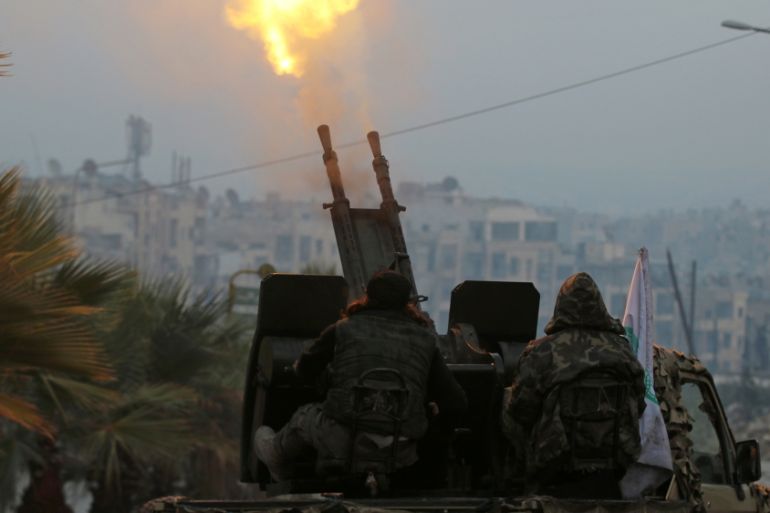Russia, Turkey: US supporting Syria ‘terrorist’ groups
Turkish president lashes out at US-led forces as Russia says new Washington defence policy would empower “jihadists”.

Turkey and Russia have separately accused the United States of backing what they call “terrorist groups” in Syria, on the same day they agreed to push for talks in Kazakhstan next month over the conflict.
Turkish President Recep Tayyip Erdogan said on Tuesday that he had evidence that US-led coalition forces give support to the Islamic State of Iraq and the Levant (ISIL, also known as ISIS) and Kurdish groups, namely the People’s Protection Units (YPG) and the Democratic Union Party (PYD).
Keep reading
list of 4 itemsMoscow theatre attack suspects show signs of beating in court
Four men showing signs of severe beating charged over Moscow concert attack
Russia mourns Moscow concert hall attack victims as death toll rises to 137
“They were accusing us of supporting Daesh,” he told a press conference in Ankara, using the Arabic abbreviation for ISIL.
“Now they give support to terrorist groups including Daesh, YPG, PYD. It is very clear. We have confirmed evidence, with pictures, photos and videos,” he said, without elaborating further about the evidence in question.
‘Ludicrous’ comments
The US state department dismissed Erdogan’s claims as “ludicrous”. Spokesman Mark Toner said there was no basis for such an accusation.
Galip Dalay, a columnist and analyst on Turkish and Kurdish affairs, said the sharp statement by Erdogan is an expression of disappointment in President Barack Obama’s Syria policy.
“Turkey believes that the Obama administration does not have the capability to hurt Turkey at this point,” he told Al Jazeera.
“So, [Erdogan] is taking the liberty to use sharp rhetoric. Ankara has been expressing its expectations for the mutual relations to get better under the incoming Donald Trump administration,” he said.
Dalay said he did not have any information on Washington’s alleged support for ISIL, but added that both the US and Russia have been supporting Syrian Kurdish forces against ISIL.
He said Washington was doing this mainly through the Syrian Democratic Forces, a multi-ethnic rebel group mainly active in the north of Syria.
“Kurdish fighters are the backbone of the group,” he said.
Dalay also stressed that Syrian Kurds, widely represented by the PYD, opened a representative office in Russia in 2016 and the two side have been in close cooperation.
READ MORE: Idlib overwhelmed by influx of Aleppo’s wounded
Separately, Russia said on Tuesday that a US decision to ease restrictions on arming Syrian rebels paves the way for deliveries of shoulder-fired anti-aircraft missiles, a move it said would directly threaten Russian forces in the country.
Maria Zakharova, a Russian foreign ministry spokeswoman, said that the policy change – set out in the annual defence policy bill and signed into law by US President Barack Obama on December 23 – would lead to weapons ending up “in the hands of jihadists with whom the sham ‘moderate’ opposition have long acted jointly.
“Such a decision is a direct threat to the Russian air force, to other Russian military personnel, and to our embassy in Syria, which has come under fire more than once. We therefore view the step as a hostile one,” Zakharova said in a statement.
A provision in the National Defense Authorisation Act, Washington’s defence policy bill, bars the US Defense Department from spending funds on anti-aircraft missiles for Syrian rebel groups until the secretaries of state and defence submit a report to congressional committees explaining the decision to do so.
The report would have to include which groups would receive the weapons, intelligence analyses on the groups and the kinds and numbers of anti-aircraft missiles to be supplied.
Reporting from Moscow, Al Jazeera’s Natasha Ghoneim said Russia was “lashing out” at the US in the final days of Obama’s administration.
“The [Russian] foreign ministry is saying that the Obama administration is trying to complicate the global situation ahead of Donald Trump, the president-elect, taking office,” she said.
Campaign of air strikes
Throughout the Syrian civil war, the US has funded several Syrian rebel groups and provided them with logistical support and weapons.
Russia, on the other hand, launched a campaign of air strikes last year in support of President Bashar al-Assad and his forces to battle opposition groups, some of which are supported by the US.
![Many of those wounded in Aleppo have been evacuated to neighbouring Turkey [EPA/SANA]](/wp-content/uploads/2016/12/5030251c21474b7c84182c536e7f0ba5_18.jpeg)
Meanwhile, foreign ministers of Russia and Turkey agreed in a telephone conversation on Tuesday to push for a ceasefire in Syria and to prepare for peace talks planned in the Kazakh capital of Astana next month.
Iran will also take part in the Astana gathering, Russia’s foreign ministry said, as Turkey called on its Gulf allies Saudi Arabia and Qatar to join the talks.
READ MORE: East Aleppo – Our memories are buried
The Syrian opposition’s main political body on Tuesday urged rebel groups to cooperate with “sincere regional efforts” to reach a ceasefire, but said it had not been invited to any conference, referring to the Kazakhstan meeting.
“We support the shifts in positions of some international powers and the positive, sincere efforts that could represent a starting point for realising the Syrian people’s aspirations by reaching an agreement that brings security and stability,” Riad Hijab, general coordinator for the High Negotiations Committee, said in a written statement distributed to the press.
|
|